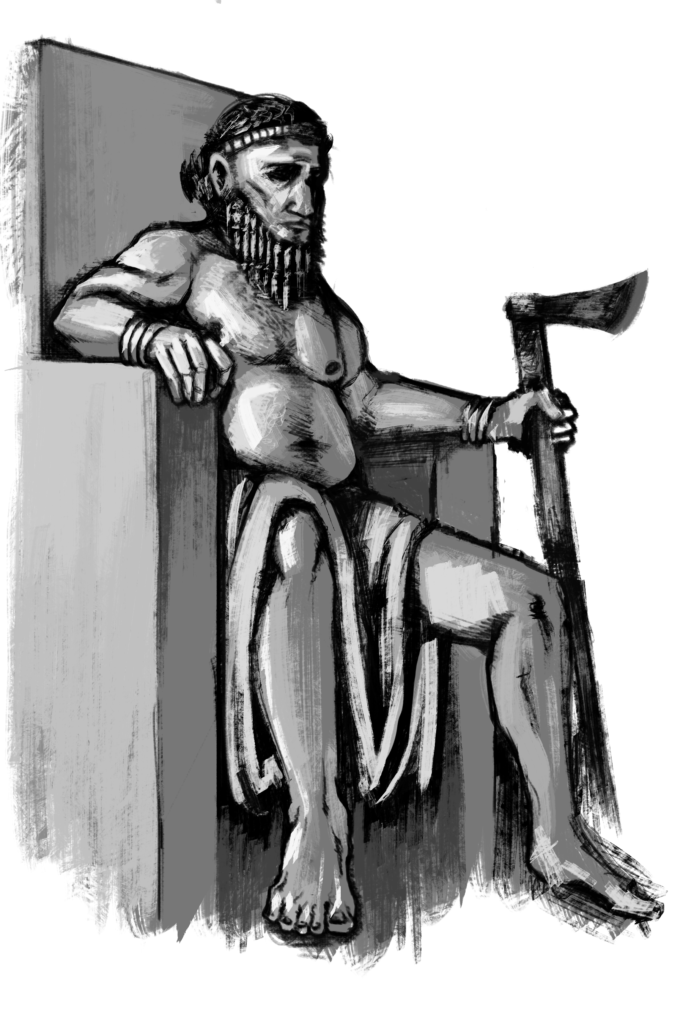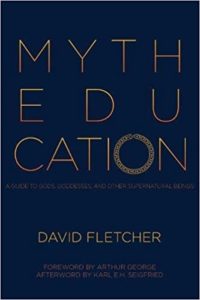In honour of the fantastic book on mythology by David Fletcher, we are running a few excerpt articles featuring some of the gods contained within the anthology.
Here is something on Gilgamesh, the famous Mesopotamian god. Grab yourself a copy of Myth Education.
Gilgamesh______________________________
a.k.a.: Bilgamesh
Pantheon: Mesopotamian
Parents: Ninsun and Lugalbanda
Symbols: bull, lion
The Epic of Gilgamesh is one of the most significant works of literature in the history of the world. Despite having been forgotten or ignored for centuries, it may be one of the most influential texts ever written.
The titular character, Gilgamesh, is a demi-god, and king of the city of Uruk. Gilgamesh was a terrible king. He was arrogant, refusing to listen to counsel from even the wisest and most experienced of his advisors. He was immoral, grabbing women, and even raping them, believing that because he was famous he could do whatever he wanted and get away with it. Obviously, no modern society would ever willingly put a narcissistic, rapacious, destructive asshole like that in power, but try to imagine what it would be like if such a thing were to happen. The people of Uruk were helpless to stop Gilgamesh and so they cried out to their gods for help.[1]

“Gilgamesh” by David Manderville
When George Smith found and translated Gilgamesh back in the 1870s he caused a stir by (accurately) dating its writing earlier than the written form of the very similar Biblical tale of Noah. Because the ancient Hebrews were neighbors to the Assyrians who wrote Gilgamesh, it is not surprising to find similarities in their mythologies. Beginning with Smith and continuing to the present, scholars have suggested that Utnapishtim’s tale was the inspiration[2] for the story of Noah. While few modern people would argue that Utnapishtim’s story should be taught as history and/or science, all too many believe that the Hebrew homage to it is both history and science. In that way, the influence of Gilgamesh looms large in the daily lives of many.At the end of a very long journey, Gilgamesh encountered an immortal named Utnapishtim. He begged Utnapishtim to give him the secret of eternal life. Unfortunately for Gilgamesh, Utnapishtim gained his immortality by being the sole survivor of a worldwide flood. It is Utnapishtim’s flood story that may be the most historically significant part of The Epic of Gilgamesh.The gods created a rival for Gilgamesh in the form of a beast-man named Enkidu. After a brief wrestling match, Gilgamesh and Enkidu became the best of friends, even calling each other “brother.” The two went on to have rousing adventures defeating monsters and defying the gods. But, after Gilgamesh and Enkidu insulted the goddess Ishtar and killed the Bull of Heaven, the gods agreed to kill Enkidu in retaliation. Enkidu did not get a glorious battlefield death befitting a hero, but instead died slowly and painfully from illness. After witnessing his dear comrade’s unromantic demise, Gilgamesh decided that he would do whatever it took to keep himself from a similar fate and so he sought out the key to immortality.
As significant as the flood narrative is, it did little good for Gilgamesh. That was not exactly an experience he could replicate to become immortal. Utnapishtim told Gilgamesh of a couple of additional routes to immortality but the king of Uruk failed them both. Defeated and depressed, Gilgamesh returned home to his people. And then he had an epiphany.[3] Gilgamesh realized that immortality isn’t gained by not dying, but by being remembered for your deeds in life. He became a just and fair leader to his people, gave up his old, abusive, and corrupt ways. As a result, when he died after many years of service to his people, he was de eply mourned, and they passed his story on for generations. The historical Gilgamesh, whose biography likely bears little to no resemblance to the events of The Epic of Gilgamesh, was a Sumerian king. Over a thousand years and several major cultural shifts later, the legacy of Gilgamesh still so strongly resonated in the region that The Epic of Gilgamesh was composed to sing of his character and deeds. Several thousand years after that, we are still talking about Gilgamesh—what greater form of immortality is there?
The tale of Gilgamesh offers some truly valuable lessons. Perhaps the most important is that while a human may die, humanity lives on and it is the job of each of us to try to leave humanity better off than how we found it. We may not all be remembered by name for centuries but we do all have the capacity to leave our mark in shaping the future. And that’s a lesson worth passing on.
[1] Back then there were no representatives you could contact to get a horrible leader kicked out of office and you had to wait and hope that the gods would do it for you. Nowadays removing a corrupt leader from office is much easier and requires appeals to democracy rather than deity.
[2] “Inspiration” being a gentle word that means “the story they totally ripped off to use for their own purposes.”
[3] Maybe that’s not quite the right word. After all, several people whom he encountered on his journey told him as much, but it didn’t really sink in until journey’s end.

